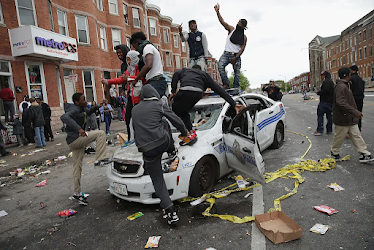"Capitalism: A Love Story" is a film by Michael Moore that focuses on the idea of capitalism and the negative consequences that it has on the middle and lower classes. The film uses statistics, stories, and previously hidden secrets to make the point that capitalism is an evil practice. I recently watched this film, and I found it to be very interesting. It was informative, entertaining, and EXTREMELY blunt. I have never seen a film done by Michael Moore before, so the experience was very new to me. There were a lot of things that I liked about the film. . . and then there were a lot of things that I wasn't a fan of.
One thing that I really appreciated about this film was Moore's use of rhetoric. He clearly knew exactly what his purpose was, who his intended audience would be, and how he wanted to convey his message. Moore's purpose was to inform people about capitalism and the toll that it is taking on the U.S. economy. His intended audience was the middle and lower classes, and throughout the film he made sure to make it very clear that he identifies himself as one of those people. The tone that Moore used changed depending on the circumstances and the current topic at hand. At times, Moore was very serious and professional, at other times he was blunt and mocking.

One thing that I found interesting about Moore was his establishment of the rhetorical triangle, which consists of ethos (ethical appeals), logos (logical appeals), and pathos (emotional appeals). He really did not have to do much to establish his ethos. Most people have heard the name Michael Moore, and many people recognize him as a well-known film maker who fights hard to make the world a better place. However, I also feel like some of his credibility was dropped do to the fact that he was in the film, directed the film, produced the film, etc.. As a member of his audience, I couldn't help but feel like that made the film less trustworthy. If he was the person who was pretty much in charge all on his own, it could have been very easy for him to manipulate the facts and twist the stories without proper guidelines or restrictions. While I felt as though his establishment of ethos was finicky, I did really appreciate the way he delivered logos.
Moore's entire film was full of all kinds of logical data, statistics, and information. He discussed the economy, Wall Street, and the impact that several presidents, including Ronald Reagan, had on capitalism. He used stories of real people to further prove his point about capitalism being evil, and he conducted many interviews on screen so that his audience could get firsthand information from capitalistic professionals, priests, and victims of capitalism.
Moore is also very skilled when it comes to establishing pathos. His film was filled to the brim with all kinds of emotions, and he was very clever when it came to sorting through those emotions and arranging them. Much of the film was very sad, angering, or serious. He told a story of a family who had owned a farm for generations, and they were being kicked out by the bank. The emotion in the family's faces was heartbreaking, and it really helped me to better understand just how difficult capitalism can be. He also told a story about an employee who had died. Somehow, the company had arranged things so that they actually got a large sum of money when he died. As I watched the man's wife tell the story, my heart broke for her. On top of that, I felt angry at those who would do such a vile thing. While Moore included many of these negative emotions into the film, he also included some happy ones. An instance that really stuck out to me was when he played an old advertisement for Denver. The advertisement was completely mocking capitalism, but it was doing so in a lighthearted, joyous way. Moore inserted several of these happy moments within the film, and it was quite a brilliant move. When people spend over an hour watching sad or angering things, they can become immune, and therefore are not impacted as much. By separating the sad stuff with some humor, Moore gave his audience a break AND renewed their vulnerability to being impacted.

Moore did a lot of things well in his film, but there were some things that I did not like. In his profession, I know that you have to be bold and direct in order to succeed at getting the point across, especially in regards to the topic that he was discussing. However, I could not help but feel that at times, Moore was a little to blunt, a little to harsh, a little to rude. It felt like he was constantly getting after the entire upper class as a whole, which I see as a problem. Just because someone is in the upper class does NOT mean that they are out seeking to steal from those less wealthy than them, and I felt like that is the impression that Moore was trying to leave us with.
I did not appreciate how he cursed several times in the film, either. I know that he was trying to connect with the middle and lower classes, and that he was trying to emphasize their frustration with capitalism. But I also know that when I heard him curse, I instantly lost some amount of trust in his ability to tell the truth. Cursing is not professional, and it really made me question whether the rest of the film was professional at all or whether it was merely done so that he could release some bottled up emotions at someone.
One other thing that I did not like was actually at the very beginning of the film. During the scene, a clip was shown of police trying to break down a door to get inside of a family's house. Moore was using the scene to emphasize what America is becoming known for. . . theft, brutality, and a controlling upper class. But when I saw the scene, the first thing that I wanted to know was what the context of that situation was. All we saw was a nice family sitting in their living room, recording a massive group of police cars pulling up to the house and breaking down the door. It was not included why the police were there to begin with or why the family thought it was appropriate to film the whole event. It felt as though Moore was purposefully painting police in a negative light. I know that there are some policemen and women out there who have bad intentions, but for the most part I am confident that the police force is doing it's absolute best to protect us. Painting the police in such a negative light, without context, felt unfair, un-patriotic, and honestly? I question whether being harsh to the police is really any different than the banks abusing the lower and middle classes through capitalism.

While there were a lot of things I didn't like about the film "Capitalism: A Love Story," there were also a lot of things that I did like. It was educational, entertaining, and it discussed a topic that is not discussed nearly enough. I admire Moore's ability to be brave and not care what anyone else thinks about him. It is admirable how comfortable he was walking up to random "high society" individuals, even when he was turned down again and again. He did a great job at using rhetoric to establish his purpose, connect with his audience, and deliver his message. Moore's film was a very mixed pot full of negative and positive emotions, messages, and opinions. I, like many others, may not love the way that Moore delivered his lesson, but I will admit that he definitely accomplished his goal in a smart and very human way. What do you think of this film?








I enjoyed reading your perspective on Michael Moore's film. I too watched this film in class and can definitely agree with you opinion on his use of logos. Although he is very much a valid filmmaker, producer, and director, for him to be all three for the same movie challenges the truth in what he might say considering he had the sole responsibility of composing the entire movie. I appreciated his investigation into Wall Street and the examples he provided involving one of America's most appreciated presidents: Ronald Reagan. I followed your confusion at the beginning of the film where a scene was shown of police invading a family home without any context of what led up to the invasion. I do agree that this shed a negative light onto the police when the purpose was really to emphasize the cruelty of the banking systems in our country. My favorite part about your blog post was that you ended it with a question. You clearly stated your opinions and observations of the film while also giving me as a reader space to develop my own opinion on what I thought of the film.
ReplyDelete